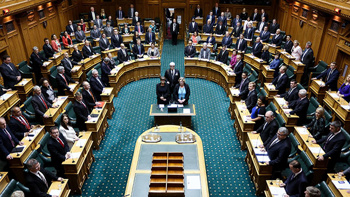Nicky Hager has claimed victory over Westpac after the bank settled and apologised in the face of claims it breached the journalist's privacy.
The settlement - including a payment to Hager and his lawyers - followed proceedings brought against the bank by the Human Rights Review Tribunal (HRRT) claiming information had been unlawfully released to police.
Felix Geiringer, one of Hager's lawyers, told Larry Williams that the move is substantial as Westpac has agreed to change their terms.
"What we have now is a promise that Westpac will soon amend their terms and conditions, so there is a contractual promise to its clients that they won't release their information as in the case with Nicky."
He says that Westpac has accepted they got it wrong, and they are now making genuine efforts.
"This is Westpac saying we accept we didn't get it right, and we are promising we won't do it like this again."
Geiringer says that Westpac made the mistake of taking the police at face value.
"You could understand why someone would accept an assertion from the police. But when it's Westpac's job to protect privacy, it was Westpac's job to make sure the police have proper basis."
He puts the blame on the law, which has grey areas that allow for incidents like this to occur.
Geiringer hopes that "basic competition" will pressure other banks to follow Westpac's change.
"But what about the other banks? ... Pressure needs to continue on those other institutions until they implement terms like the ones announced today by Westpac," he said.
In an statement released today, Hager welcomed the development.
"I was confident we were going to prevail before the HRRT, but that was likely to have been several years away. Westpac have done the right thing here by owning up to the breach and putting in place much better procedures to protect against it happening again," he said.
"This is an important victory for privacy in New Zealand. It will help many people."
The terms of the settlement include an apology from Westpac, and what Hager's lawyers described as a "significant tightening" of its policies allowing the release of private data.
Westpac said in a statement its new policy now required a production order from authorities before releasing private information, except in "extremely limited circumstances" such as Police searches for missing persons.
"We apologise to Hager for our part in the distress these events have caused him and his family," the statement said.
"Westpac's practice at that time was to comply with such requests in the belief that it was entitled to do so under the Privacy Act. However, in the light of the public discussion of Hager's and other cases, it is clear that bank customers reasonably expect that in similar circumstances such data will be kept private."
In 2017, Privacy Commissioner John Edwards ruled the bank had breached Hager's privacy without any legal obligation to do so, knocking back Westpac's claim during arguments that their client's rights to privacy were waived in their terms in conditions.
Until the ruling the broad practice of banks, not just Westpac, releasing financial information to police and other agencies on request - without requiring a search warrant or other legal order - had been relatively commonplace.
The settlement is the latest and possibly last step in sprawl of cases brought by Hager challenging police over-steps in their investigation into the source for his book "Dirty Politics".
In October 2014, police raided the Wellington home of Hager in a bid to determine the identity of Rawshark, the hacker who provided emails and chatlogs of blogger Cameron Slater which formed the core of the book which rocked that years' election campaign.
Last year police settled with Hager and paid "substantial damages" after the High Court expressed concern over the way detectives obtained and executed their warrant and ruled the search to have been illegal.
Police had failed to tell the judge who signed the warrant that Hager was a journalist, which ignored legal protections for news media who received material in confidence.
Material taken by police during the raid was forced to be returned or destroyed.
Take your Radio, Podcasts and Music with you









